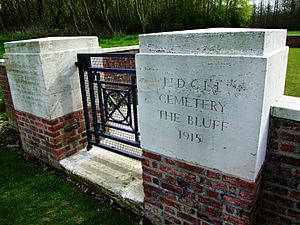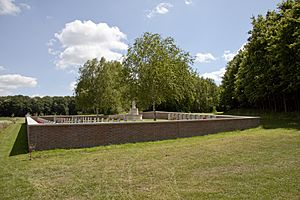First DCLI Commonwealth War Graves Commission Cemetery, The Bluff facts for kids
Quick facts for kids First DCLI Cemetery, The Bluff |
|
|---|---|
| Commonwealth War Graves Commission | |
 |
|
| Used for those deceased 1915 | |
| Established | 1915 |
| Location | 50°49′14″N 02°54′47″E / 50.82056°N 2.91306°E near |
| Designed by | J R Truelove |
| Total burials | 76 |
| Burials by nation | |
| Burials by war | |
|
World War I: 76
|
|
| Statistics source: WO1.be | |
The First DCLI Cemetery, The Bluff is a special place in Belgium. It is a burial ground for soldiers who died during World War I. This cemetery is managed by the Commonwealth War Graves Commission.
It is located near a place called "The Bluff" in Ypres (pronounced EE-per). The cemetery gets its name from the Duke of Cornwall's Light Infantry (DCLI). This was a British army group.
What is "The Bluff"?
"The Bluff" was not a natural hill. It was a man-made ridge. This ridge was created from dirt dug out during attempts to build a canal.
Because it was higher than the flat land around it, "The Bluff" was very important. Soldiers could see far from its top. This made it a key target during the war.
German forces captured "The Bluff" in February 1916. But British soldiers from the 14th (Light) Division took it back on March 2. Later, in July 1916, the Germans set off a huge mine under the ridge. They hoped to destroy it, but they did not capture it.
The Germans took "The Bluff" again in 1918 during their Spring Offensive. However, the 14th (Light) Division finally won it back on September 28. Today, this area is a peaceful nature park. It is called "Provinciaal Domein Palingbeek."
How the Cemetery Started
The Duke of Cornwall's Light Infantry (DCLI) started this cemetery. They began burying their soldiers here before the big battles of 1916.
When the war ended, the cemetery only had DCLI soldiers buried there. But later, more graves were moved here from other battlefields. This made the cemetery bigger.
J R Truelove designed the cemetery. The land for the cemetery was given to the United Kingdom forever. King Albert I of Belgium did this. It was a way to thank the British Empire for helping to defend and free Belgium during the war.
 | Delilah Pierce |
 | Gordon Parks |
 | Augusta Savage |
 | Charles Ethan Porter |


